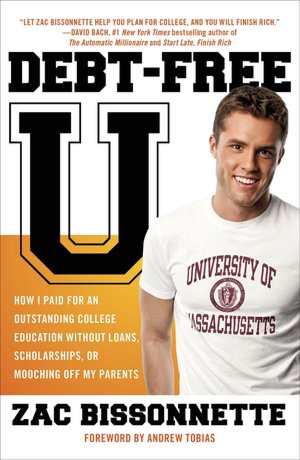I've been scraping the bottom of the barrel for ideas. My search engine is exhausted of results for content farms that require little experience. My plasma is not market quality. There aren't many options for employment for 3 nights a week or fewer, especially within walking or T distance. And frankly, the whole prospect of college, when we're already trying to pay off student debt is a bit overwhelming unto itself. That's why I perused through the college guides at the Coop bookstore last night, and picked up Debt Free U by Zac Bissonette.
I've thumbed through a number of college finance books before and found that they mostly explained nauseousness like how to calculate an Expected Family Contribution and how to take out a Parents PLUS Loan. What attracted me to Debt Free U was that I don't want to take out a student loan. I can't! Student debt is the highest debt in the country today, and it's the hardest kind to get out of. Plus, in this market, it's foolish to say that student debt is leverage against earnings after graduation. Whatever. That's exactly what this book purports- that student loans are bad for quality of life over all, unnecessary to pay for school, and inside are instructions to do without them. What's more, Bissonette published the book as a Senior at the University of Massachusetts with a job at AOL Money & Finance. Alright, I thought, I'll bite.
It's a quick read- I can tell you that much. It's kept me plenty entertained with quips throughout like "FAFSA stands for Free Application for Federal Student Aid-but for our purposes let's think of it as Federal Assault on Family Savings Accounts." There are plenty of studies and statistics, or a lack thereof, to support the things the book claims, as well as anecdotes to keep the faith.
What Debt Free U has going for it is sound financial advice. A college education is necessary, and as it shows, doable. If it means getting a second job or going to community college for two years, it's necessary and doable. The pages are full of ideas of just how to make that happen, and already my head is brewing. I particularly enjoyed the suggestions for part time work. Bissonnette also provides a wealth of suggestions for how to get the most out of the college experience from "How to Deal With Professors," to "[Networking] Like a Pro."
I did find some of the logic a bit naive, however. One example was the topic of "Finding the college that fits." Bissonette claims the entire notion is a myth- that a college is a college is a college. He sights findings that there is no study showing that one college is better than another at educating its students. But first, just because we don't know if one is better than the other, doesn't mean they're all the same. That's a bit obvious. Second, one doesn't take into consideration that colleges are little microcultures all their own. I reject the idea completely that college life is exactly the same all across the country. I know this because I went to BYU-Idaho (the most concentrated example of campus-wide-culture in the country) and it was anything but a good fit. Did I make friends? Yes. Did I have good classes? A couple. Did it fit me? Hell, no! There are a number of reason contributing to my first failure as a student, but were all other circumstances set aside, I'd rather jab out my eyes than go back. What's more, I know a number of people who were unhappy with their college careers at one point or another because the school they attended (often for financial responsibility) was not a "good fit." I also look to a good friend and mentor who attended and paid for the graduate school of his dreams, solely for the enrichment and quality of life he knew he'd get. "It was my choice, my money," he once wrote," and I haven't regretted a penny of it."
So will the book save me $100,000 in fees? Not likely. In fact, many of the suggestions, such as going community college first, I'm already taking. But it's got my mind flowing with ideas of where I can save and what I can do to get started paying for school without a loan. If nothing else, it was an entertaining read, and I'll probably sell my snowboard after this, so I'll at least get my $16 back.
So will the book save me $100,000 in fees? Not likely. In fact, many of the suggestions, such as going community college first, I'm already taking. But it's got my mind flowing with ideas of where I can save and what I can do to get started paying for school without a loan. If nothing else, it was an entertaining read, and I'll probably sell my snowboard after this, so I'll at least get my $16 back.

No comments:
Post a Comment